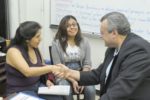Depending on how your child is doing in school, you may consider the parent–teacher conference an inconvenient formality or a much-anticipated opportunity to gain insight into your less-than-forthcoming student—or even to air grievances.
Because many teachers have scores, or even hundreds, of students on their rosters each year, conferences may be the only chance for you to spend uninterrupted time discussing your child’s academic and social performance with his or her teacher. So here are some tips to make it a successful parent–teacher conference this year!
Prepare for the Parent–Teacher Meeting
First and foremost, make it a top priority to attend the conference. Not only will you gain valuable insight from the meeting, you’ll be showing the teacher that you are an involved, interested, active parent. Then, do your homework in the days leading up to the conference. Sit down with your child to collect information and data you’ll need in order to decide what topics to discuss.
Ask your child what they like and dislike most about school. Keep the questions somewhat vague. You may expect your child to say they hates math, for example, but they may surprise you by saying something completely unexpected.
Ask you child, “What am I going to hear from your teacher?” This is a must-ask question. Ask, then listen carefully! If there are problem areas (academic or behavioral), you need to know before the conference.
After talking to your child, make a list of things you want to tell the teacher. Will your family dynamic be changing in the near future? Has your child been bullied by another student? Is your child unusually sensitive? Has your child been struggling to complete homework every night? Are you or your child concerned they get too much homework? The conference is your opportunity to provide valuable insight to the teacher.
Tips for the Parent–Teacher Conference
Enter the meeting with an open mind and, perhaps, a thoughtful token of appreciation. If you plan to stop by Starbucks on the way to the conference, why not pick up a latte or a muffin for the teacher, who probably has a list of back-to-back appointments lined up.
Time is limited, so lead with your most important question. If there’s no pressing issue you need to discuss then ask:
“What do I need to know about my child?”
Your child’s teacher probably spends more time with your child than any other non-familial adult. Plus, they are a trained professional who has taught hundreds or thousands of children. This question can provide priceless insight in a short period of time!
If there is a problem, issue, or concern you need to discuss, be mindful of your tone and body language. Do not accuse or put the teacher on the defensive. When the teacher responds, don’t cut her off or interrupt. Listen to what’s being said instead of formulating your rebuttal. You want to have a good parent–teacher relationship!
Conclude the meeting by asking:
“Is there anything we can change to make the remainder of the school year even better?”
You’re using “we” here to include the teacher, student, and you as the parent. From hiring a tutor to changing your student’s assigned seat to getting extra enrichment assignments, there is always something that can be improved upon!
Post-Meeting Follow Up
Once you’ve had time to absorb the information you gathered at the conference, share what you learned with all those involved and your child and put into practice any action items. Allow your child to provide feedback on what you learned. If necessary, come up with a list of concrete changes you or your child should make going forward.
In the days following the conference, be sure to send your child’s teacher a short follow-up note or email. Thank them for the insight, repeat any action items you both agreed to, and encourage them to reach out to you anytime with tidbits about your child, good or bad.




































